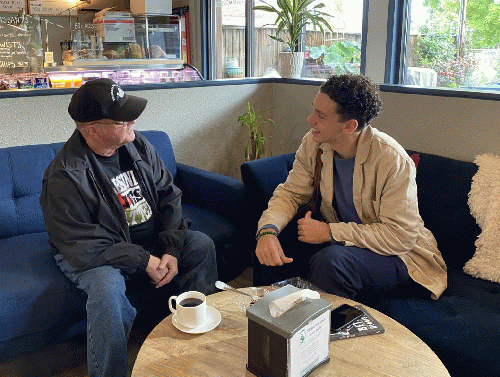Hoping to understand why good people support genocidal behavior, I invited a Zionist friend to coffee to exchange thoughts on the Israeli invasion of Gaza.
We met three times, including twice after the International Court of Justice ruled in January that there was a plausible case that Israel's tactics constituted genocide (an opinion more than 500 genocide experts had expressed in a public letter released Oct. 15).
The ICJ ruling cited Israel's systematic commission of war crimes in its response to the Hamas attack, crimes that continue today. This is why warrants are being prepared by the International Criminal Court for the arrest of Netanyahu and his defense minister, and why the International Court of Justice ordered Israel to stop its Rafah offensive to allow aid in.
The conversations with my friend were enlightening. She would state her opinions about why the assault on the Palestinian people was justified, and I would cite factual sources that undermined the assumptions behind her arguments.
At her request, I supplied links to the sources of my claims, including Israeli newspapers and mainstream press articles, citing Israeli sources. She said little about the information I shared. Instead, she raised new arguments each time we met for why Israel had no choice but to continue its wholesale slaughter of the population of Gaza.
I eventually realized that she was able to support the destruction of an entire people because she didn't want to confront the facts. I think she suspected that knowing the whole truth might undermine her deeply held beliefs about Israel and perhaps Zionism itself.
I haven't heard from my friend lately. I miss talking to her. Until Oct. 7, she always had a bright smile and a carefree, friendly demeanor. I'm sure we had much in common besides membership in a local interfaith group and concern for the lives endangered by the 100-year-old conflict that has exploded since Oct. 7.
The critical difference between us was that her concern seemed almost exclusively for the safety of Israelis. She seemed adamant that the ongoing bombardment and starvation of tens of thousands of innocent civilians was an appropriate response to a single attack by a specific group among them.
I wonder: Has she ever seen the pictures of the Palestinian children mutilated by Israeli bombs, or those emaciated as a result of Israel's use of starvation as a weapon?
I suspect that if my friend were to acknowledge the reality that what is happening to Gazan civilians is not the result of a war but of systematic war crimes, she would understand why millions are outraged by Israel's actions. Perhaps then she would realize that slaughtering civilians will not make Israelis safer.
Despite our differences, I still regard this person as my friend. I refuse to let a conflict between us diminish my regard for her as a human. This attitude is not based solely on my spiritual beliefs; it is an essential part of waging peace.
True peace requires us to look beyond our differences, even when seemingly insurmountable, to see the humanity of others beneath their fear and anger.
We must abandon the notion that any human is "the other" and beyond redemption. When your identity is based on membership in the human family, these illusions fall away.
A lasting peace in Palestine/Israel will require justice. There can be no justice unless negotiations are based on recognition of mutual rights and acknowledgement of facts.
However painful it may be to surrender one's cherished fantasies, that pain is nothing compared to the suffering Zionists are causing Gazans, and all Palestinians.
This essay was originally published in the Albany Democrat-Herald on June 18, 2024 as Why good people support genocidal behavior. Rights retained by author.






